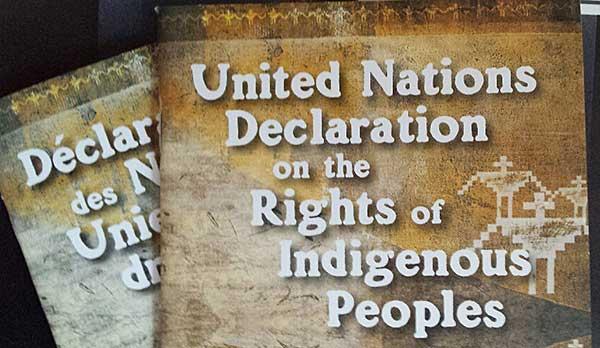The Coalition for the Human Rights of Indigenous Peoples – made up of Indigenous Nations, Indigenous peoples’ organizations, civil society groups and individual experts and advocates – is commending Members of Parliament on the adoption of Bill C-262, a private members bill to implement the UN Declaration.
Grand Chief Wilton Littlechild, who served as Commissioner with the Truth and Reconciliation Commission, said today, “The UN Declaration on the Rights of Indigenous Peoples is a crucial and indispensable tool for the urgent work of reconciliation. Romeo Saganash deserves the thanks of all Canadians for bringing this Bill forward, as do all the other Members of Parliament who supported it. With Bill C-262 now moving to the Senate, we have cleared an important hurdle in bringing the UN Declaration to life in Canada.”
Bill C-262 sets out a legislative framework requiring the federal government to collaborate with First Nations, Inuit and Métis peoples in developing a national action plan to fully implement the UN Declaration. Adoption of C-262 into law will also require the federal government to work with Indigenous peoples to review and reform domestic laws and policies to ensure that they are consistent with the requirements of the Declaration.
Grand Chief Abel Bosum of the Grand Council of the Crees (Eeyou Istchee) said, “The Cree Nation of Eeyou Istchee is proud to have played an important role over the past 35 years in the development of the UN Declaration. We are especially proud that one of our favourite sons, the Honourable Romeo Saganash, was part of that effort and has now played the critical role in ensuring that the Government of Canada, through passage of Bill C-262, has committed to full and effective implementation. It is a great day for Indigenous peoples throughout Canada and the world, and a great day for Canada.”
Cheryl Casimer of the First Nations Summit Political Executive explained, “Yesterday’s vote in the House of Commons was a momentous occasion. Bill C-262 is the first federal legislation to explicitly repudiate colonialism. When the Bill becomes law, it will also provide a critical framework to finally address the lingering legacy of colonialism in federal laws and policies that continue to discriminate against Indigenous peoples and deny them the opportunity to fully enjoy their basic human rights.”
The ultimate purpose of Bill C-262 is to establish a principled and collaborative framework to move ahead with implementing a crucial human rights instrument that Canada and the international community have repeatedly affirmed represents the minimum standards for the survival, dignity and well-being of Indigenous peoples.
Jennifer Preston of the Canadian Friends Service Committee said, “For everyone who has worked so hard to see the Declaration implemented in Canada, it was emotional moment at the House of Commons when the Bill was passed. We would like to take this moment to thank all those individuals who contacted their Members of Parliament to express their support for the UN Declaration and this Bill.”
Law professor Brenda Gunn stated, “We are, of course, disappointed that members of the Conservative party chose to vote against Bill C-262 despite the fact that the federal government under Stephen Harper had actually endorsed the UN Declaration. In the weeks ahead, we will be urging members of the Senate to set aside partisan politics and embrace this opportunity to begin building a more just and honourable relationship between Indigenous and non-Indigenous peoples in Canada.”
National Chief Perry Bellegarde of the Assembly of First Nations added, “I urge Members of the Senate to deal expeditiously with this Bill and look forward to the historic day, now closer than ever, when it is given Royal Assent. That will move all of us forward and create a more fair and just country.”
Background
The UN Declaration was the subject of one of the most extensive standard setting processes ever undertaken in the international human rights system. The collaboration between Canadian government representatives and Indigenous peoples during the final years of negotiation was a key factor in developing a text that could attain broad, global support. Today, the Declaration stands as a global human rights instrument, reaffirmed 8 times by the UN General Assembly by consensus.
Bill C-262 has five key elements:
Bill C-262 sets out the principles that must guide implementation of the Declaration, including repudiation of colonialism.
Bill C-262 provides clear public affirmation that the standards set out in the UN Declaration have “application in Canadian law.”
Bill C-262 requires a collaborative process for the review of federal legislation to ensure consistency with the minimum standards set out in the UN Declaration.
Bill C-262 requires the federal government to work with Indigenous peoples to develop a national action plan to implement the UN Declaration.
Bill C-262 provides transparency and accountability by requiring annual reporting to Parliament on progress made toward implementation of the Declaration.
The Coalition for the Human Rights of Indigenous Peoples
This media release was endorsed by:
Amnesty International Canada / Amnistie Internationale Canada
Assembly of First Nations
BC Assembly of First Nations
Canadian Friends Service Committee (Quakers)
First Nations Summit
First Peoples Justice Center of Montreal
Grand Council of the Crees (Eeyou Istchee)
Brenda Gunn, Associate Professor, Robson Hall Faculty of Law, University of Manitoba
International Chief of Treaty 6, 7, 8, Wilton Littlechild, former Truth & Reconciliation Commissioner
KAIROS: Canadian Ecumenical Justice Initiatives
Sheryl Lightfoot, Canada Research Chair in Global Indigenous Rights and Politics
MEDIA CONTACT
Jacob Kuehn, Amnesty International Canada (English Canada): jkuehn@amnesty.ca; +1 613 744 7667, extension 236





















